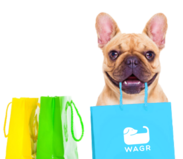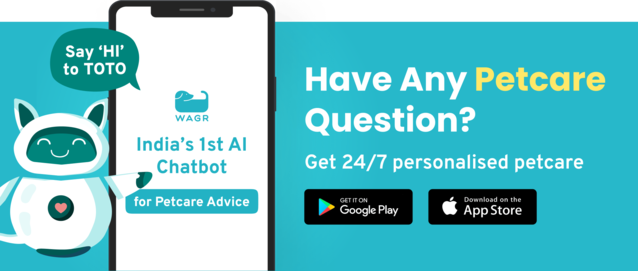It’s tough times for pet owners in India today. With work-from -home coming to an end, already dealing with issues like separation anxiety and stress in pets, owners have a new problem on their hands - parvovirus.
What is parvovirus and how can you keep your pets safe? We give you all the info you need to understand the virus and the steps to take to prevent your pet from being affected.
First, What is Parvovirus?
Parvovirus, also commonly known as just parvo, is a highly contagious and potentially fatal disease that affects dogs and cats. It can be found in the top layer of soil, which makes it easy to contract. The virus may also live on surfaces for months, even after they've been cleaned.
Parvo’s scientific name is Canine parvovirus type 2 (CPV) was discovered in 1976 among dogs in the US and Europe. The virus spread very quickly over the next two years infecting cats and dogs globally. While you can’t get infected by your pet, humans can contract a different version of Parvo (scientifically termed B19) and is spread from person to person.
The virus is rapidly spread through direct contact with dogs, people, and contact with contaminated feces or objects in the environment like the surfaces of kennels, food bowls, clothing, etc. The virus can live outdoors for long periods of time through all sorts of weather and indoors for as long as two months. It is also extremely resistant to common household cleaning materials and disinfectants.

Vets attribute the rise in cases in the last few months to the monsoon. Water is a carrier and it's inevitable that dogs come in contact with contaminated water and soil on the roads. Delay in regular vaccinations is also a probable cause for the virus to spread, so make sure your pets are up-to-date with their vaccinations.
With the advancements in technology and the internet, pet owners can now seek the help of online veterinary doctors from the comfort of their homes. One such platform that has been gaining popularity among pet owners is Wagr. Wagr's online veterinary doctor service allows pet owners to consult with experienced veterinarians through video calls and chat options. With Wagr, pet owners can easily book appointments, receive veterinary prescriptions, and get all their queries answered by qualified veterinary doctors without having to leave their homes. Parvo affects all dogs but unvaccinated dogs and puppies under four years old are most vulnerable. Although parvo is not always fatal, it is quite dangerous. Infected dogs need close monitoring and a vet’s supportive care to help them recover.
What Are The Common Symptoms of Parvo?
The virus affects a dog’s intestines and reduces its capability to absorb nutrients and weakens the immune system. The virus can cause acute gastroenteritis (inflammation of the stomach and intestines) in animals, leading to vomiting, diarrhoea, dehydration, and weight loss. They may also be lethargic and stop eating or drinking anything at all. Furthermore, this disease is very dangerous because animals can get dehydrated quickly without enough fluid intake or because of frequent vomiting.

What Are The Different Stages of Parvo?
The virus goes through seven different stages from infection to recovery.
Stage 1: Infection
This is where the dog is first exposed to the virus via a surface, fecal matter or other carriers.
Stage 2: Incubation
The virus has now entered your dog’s body and is going through an incubation stage, which lasts between three to five days.
Stage 3: Symptoms
Here’s where the dog first starts showing symptoms. This happens between five and eight days after your dog first came in contact with the virus.

Stage 4: Diagnosis
Time is of essence at this point. It’s critical to rush your dog to the vet for a medical evaluation as soon as you notice their symptoms. Your vet will most probably run a few quick tests, look at the dog’s history and clinical signs to confirm if it’s parvo.
Stage 5: Treatment
Treatment is decided based on the severity. Most dogs are immediately isolated from other dogs and treated with a combination of antibiotics, antiemetics, the right nutrition, and intravenous injections. Homecare is possible if pet parents are open to administering the required drips and other necessary medical care.
Stage 6: Recovery
If dogs make it through the first three to four days, they have a great chance at complete recovery. Studies have shown that dogs have up to 86% chances of survival with good treatment but far less without. Extra care is needed through the recovery stage as your dog’s condition is still delicate with an immune system that requires more fortification. Other infections at this time are common if you’re not careful.
Stage 7: Confirmation of recovery
Your vet will need to do more tests after 15-30 days to confirm that the virus has truly left your pet’s system.
Post-Parvo Care for Your Dog
Pets continue to be weak even after the vet has determined they’re free from the virus. Like a hurricane that leaves homes damaged, your pet is still recuperating from a weakened digestive system. They need gentle care and attention to make a full recovery.
During this time, pets should be on a vet-recommended diet to accommodate their delicate gastrointestinal tract. Most vets recommend easily digestible, simple home-cooked meals.
Your pet is still considered contagious and would be restricted from public spaces. They would still be quite lethargic and fatigued with small amounts of activity. Exercising your dog in this scenario is not a good idea. Instead, give them a calm corner to rest until they’re ready to play.
So, how do you know if your pet is getting better and recovering from parvo? Check their faeces. At the end of the treatment duration, their faeces should start appearing normal with no traces of blood. This is a sign that their intestinal tract is getting stronger. They will also start showing more interest in food, stop vomiting, and gradually improve their energy levels.
How to Keep Your Pet Safe
Parvo has no cure and is best avoided with preventive measures. The best, most practical solution is to get your puppy vaccinated. Vets generally advise that the vaccine be given when the dog is around six weeks. This is followed by three booster doses every three weeks.
Vaccination does not prevent your dog from contracting the virus entirely. Just like the Covid vaccine for humans, it mitigates the symptoms, boosts their immune system, and helps your dog recover faster.
Prior to being vaccinated, really young puppies must be under keen supervision to prevent them from stepping into faeces or bounding into potentially contaminated areas. They also should not be allowed to play with other dogs or be in close contact with them unless they are vaccinated.
After your pet’s recovery from parvo, it’s very important to disinfect your home and the immediate area outside with a strong bleach solution.
Good, hygienic practices, preventive care and support will ensure your pet stays safe and healthy.

Ask the Vet
How much does parvo treatment cost?
The cost of parvo viral enteritis treatment depends mainly on the duration of the illness. Most often, treatment will require critical care for 5-7 days in young unvaccinated puppies. In private, outpatient services, the cost could range from INR 12,000-14,000 inclusive of diagnostics, crystalloid and colloid supportive therapy. In in-patient services, the treatment cost would double, if not more.
What are the vaccination schedules?
Vaccination should be done with DHLPPi vaccines at 45 days of age, with 2 boosters at an interval of 21 days each. This is to be followed by yearly booster shots.
Does the cost change depending on the breed?
The cost of supportive therapy normally doesn't vary based on the breed. However, breeds such as Rottweilers, Labrador, Dobermann are more susceptible to the infection, making hospitalization a necessity, which adds to the costs.
Will my dog need hospitalization?
Not all dogs require hospitalization. The disease is milder in unvaccinated adults when compared to unvaccinated puppies. Therefore, it’s mostly the latter that require critical care admissions.
How long will it take for tests to confirm if my dog is parvo positive or not?
Vets perform faecal ELISA tests from faecal swabs and the results can be obtained in about 15 minutes.












